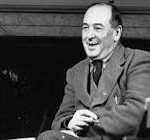One’s first impression of Lewis is that he was the stereotypical professor – a person with a brilliant mind who was so focused on intellectual pursuits that he rarely noticed things like how his clothing was a bit tattered and did not match the latest fashion. However, his community of family and friends knew him to be a kindhearted man who was a child at heart.
A little known fact about Lewis is that he donated nearly all of his earnings from his book sales to charities and those in need. His rationalized that his profession was being a professor, so he should live on the salary he was allotted and donate any extra income to support others such as the widows of Oxford.
Lewis’s Legacy – The Books that Bear his Name
As a writer, Lewis is best known for being a spokesman for the Christian faith after going through a period in his younger years of being an outspoken atheist. As a teenager he encountered a brilliant teacher at his boarding school who was an atheist. The intellect of this teacher inspired Lewis to turn away from the teachings of the Church of Ireland that he was taught as a child. In his late 20’s and early 30’s, interacting with other Oxford professors and British intellectuals such as J.R.R Tolkien (author of the Lord of the Rings trilogy) influenced Lewis to believe that theist and Christian worldviews presented the most accurate picture in which to understand life.
Even though Lewis wrote many best-selling works on the Christian religion, he admits that he was no saint. He spent the majority of his life as a bachelor where he would love spending time with friends in Oxford pubs. At the pubs, the guys would have a beer, smoke a pipe, cuss, and get so rowdy that they were occasionally asked to leave by the owner. However, Lewis did more in these pubs than fraternize. These pubs were the meeting points of a literary society called the Inklings. met in the Eagle. Their meetings consisted giving advice on how to improve each other’s works, and this advice helped to produce many bestsellers from people who are known viewed as some of the best authors of the 20th century (Lewis, Tolkien, Dorothy Sayers, Charles Williams and Owen Barfield) would provide each
Becoming a Child
In addition to the castle-like buildings that dominate the skyline of Oxford, this quaint English city also boasts great walking trails. Lewis would go on these trails for hours at a time, letting his imagination go wild thinking about things such as talking animals and magical wardrobes, as if he were still a child. Though Lewis was a serious academic who wrote scholarly works that most today would have trouble comprehending, he preferred reading and writing children’s books because he loved returning to the hope and dreams that he had as a child.
On Finding Love
Though Lewis happily spent a majority of his life as a bachelor, he was able to fall in love at the end of his life in his 60’s with an American writer named Joy Gresham. Lewis noted the irony of falling in love with someone named “Joy” since the topic of joy was one of the major themes in his prior. Lewis admitted that his marriage allowed him to obtain the happiness that most men have in their twenties.
Lewis and Joy would have a wonderful marriage until Joy had a relapse of bone cancer. Her second battle with cancer took her life. Lewis was devastated. Though he was a mature scholar who had written frequently on the topic of pain and emotional distress, he had a very difficult time with processing Joy’s death. During his time of bereavement, Lewis expressed resentment against God and the world for why things had to happen in the way they did. This anger and resentment eventually allowed him to understand that we will always have battles with pain and sorrow. Experiencing this pain and sorrow led him to belief that God’s intention is to make things better, and God sometimes allows us experience pain to instruct us how to improve our lives.
Post Footer automatically generated by Add Post Footer Plugin for wordpress.





